Related Research Articles

Apollo or Apollon is one of the Olympian deities in classical Greek and Roman religion and Greek and Roman mythology. Apollo has been recognized as a god of archery, music and dance, truth and prophecy, healing and diseases, the Sun and light, poetry, and more. One of the most important and complex of the Greek gods, he is the son of Zeus and Leto, and the twin brother of Artemis, goddess of the hunt. He is considered to be the most beautiful god and is represented as the ideal of the kouros. Apollo is known in Greek-influenced Etruscan mythology as Apulu.

Alexander III of Macedon, commonly known as Alexander the Great, was a king of the ancient Greek kingdom of Macedon. He succeeded his father Philip II to the throne in 336 BC at the age of 20, and spent most of his ruling years conducting a lengthy military campaign throughout Western Asia and Egypt. By the age of 30, he had created one of the largest empires in history, stretching from Greece to northwestern India. He was undefeated in battle and is widely considered to be one of history's greatest and most successful military commanders.

Ephesus was a city in Ancient Greece on the coast of Ionia, 3 kilometres (1.9 mi) southwest of present-day Selçuk in İzmir Province, Turkey. It was built in the 10th century BC on the site of Apasa, the former Arzawan capital, by Attic and Ionian Greek colonists. During the Classical Greek era, it was one of twelve cities that were members of the Ionian League. The city came under the control of the Roman Republic in 129 BC.
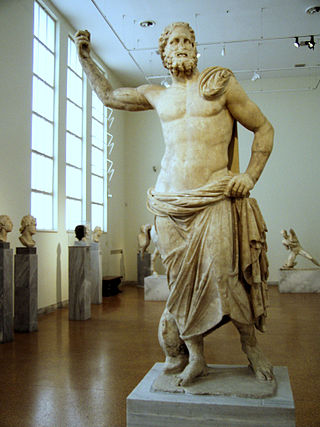
Poseidon is one of the Twelve Olympians in ancient Greek religion and mythology, presiding over the sea, storms, earthquakes and horses. He was the protector of seafarers and the guardian of many Hellenic cities and colonies. In pre-Olympian Bronze Age Greece, Poseidon was venerated as a chief deity at Pylos and Thebes, with the cult title "earth shaker"; in the myths of isolated Arcadia, he is related to Demeter and Persephone and was venerated as a horse, and as a god of the waters. Poseidon maintained both associations among most Greeks: He was regarded as the tamer or father of horses, who, with a strike of his trident, created springs. His Roman equivalent is Neptune.

The Seleucid Empire was a Greek power in West Asia during the Hellenistic period. It was founded in 312 BC by the Macedonian general Seleucus I Nicator, following the division of the Macedonian Empire founded by Alexander the Great, and ruled by the Seleucid dynasty until its annexation by the Roman Republic under Pompey in 63 BC.

Macedonia, also called Macedon, was an ancient kingdom on the periphery of Archaic and Classical Greece, which later became the dominant state of Hellenistic Greece. The kingdom was founded and initially ruled by the royal Argead dynasty, which was followed by the Antipatrid and Antigonid dynasties. Home to the ancient Macedonians, the earliest kingdom was centered on the northeastern part of the Greek peninsula, and bordered by Epirus to the southwest, Illyria to the northwest, Paeonia to the north, Thrace to the east and Thessaly to the south.
This article concerns the period 249 BC – 240 BC.
Year 240 BC was a year of the pre-Julian Roman calendar. At the time it was known as the Year of the Consulship of Centho and Tuditanus. The denomination 240 BC for this year has been used since the early medieval period, when the Anno Domini calendar era became the prevalent method in Europe for naming years.

Ancient Greece was a northeastern Mediterranean civilization, existing from the Greek Dark Ages of the 12th–9th centuries BC to the end of classical antiquity, that comprised a loose collection of culturally and linguistically related city-states and other territories. Most of these regions were officially unified only once, for 13 years, under Alexander the Great's empire from 336 to 323 BC. In Western history, the era of classical antiquity was immediately followed by the Early Middle Ages and the Byzantine period.
Aristomachus may refer to:

Cleomenes III was one of the two kings of Sparta from 235 to 222 BC. He was a member of the Agiad dynasty and succeeded his father, Leonidas II. He is known for his attempts to reform the Spartan state.
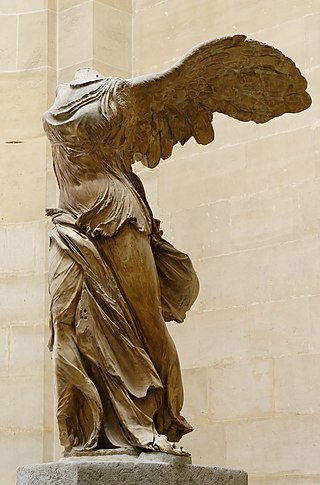
In classical antiquity, the Hellenistic period covers the time in Mediterranean history after Classical Greece, between the death of Alexander the Great in 323 BC and the death of Cleopatra VII, followed by the emergence of the Roman Empire, as signified by the Battle of Actium in 31 BC and the conquest of Ptolemaic Egypt the following year. The Ancient Greek word Hellas was gradually recognized as the name for Greece, from which the word Hellenistic was derived. "Hellenistic" is distinguished from "Hellenic" in that the latter refers to Greece itself, while the former encompasses all ancient territories under Greek influence, in particular the East after the conquests of Alexander the Great.
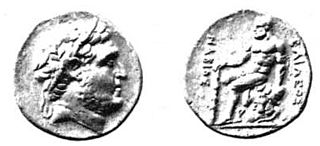
Nabis was the last king of independent Sparta. He was probably a member of the Heracleidae, and he ruled from 207 BC to 192 BC, during the years of the First and Second Macedonian Wars and the eponymous "War against Nabis", i.e. against him. After taking the throne by executing two claimants, he began rebuilding Sparta's power. During the Second Macedonian War, Nabis sided with King Philip V of Macedon and in return he received the city of Argos. However, when the war began to turn against the Macedonians, he defected to Rome. After the war, the Romans, urged by the Achaean League, attacked Nabis and defeated him. He then was assassinated in 192 BC by the Aetolian League. He represented the last phase of Sparta's reformist period.
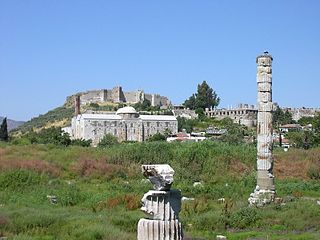
The Ephesian Tale of Anthia and Habrocomes by Xenophon of Ephesus is an Ancient Greek novel written before the late 2nd century AD, though in 1996, James O’Sullivan has argued the date should actually be seen as closer to 50 AD.
Aristomachos of Argos was a general of the Achaean League in Ancient Greece who served only for a year, 228 – 227 BCE. His father Aristomachos the Elder and his brother Aristippos had both been tyrants of the city of Argos, and after the latter's death in 235 BCE the younger brother became tyrant himself. In 229 BCE he was convinced to resign by Aratus of Sicyon and let his city join the Achaean League. As a reward, he was elected strategos of the League. Later he betrayed Argos to Cleomenes of Sparta. When Argos was retaken by the forces of Achaea and Macedonia, he was tortured and executed, probably in 223 BCE.

The Ptolemaic Kingdom or Ptolemaic Empire was an Ancient Greek state based in Egypt during the Hellenistic period. It was founded in 305 BC by the Macedonian general Ptolemy I Soter, a companion of Alexander the Great, and ruled by the Ptolemaic dynasty until the death of Cleopatra VII in 30 BC. Reigning for nearly three centuries, the Ptolemies were the longest and final dynasty of ancient Egypt heralding a distinctly new era for religious syncretism and the blending of a new Greco-Egyptian culture.
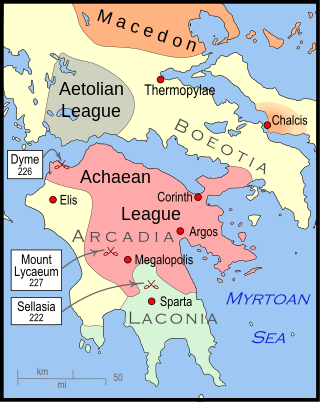
The Cleomenean War was fought between Sparta and the Achaean League for the control of the Peloponnese. Under the leadership of king Cleomenes III, Sparta initially had the upper hand, which forced the Achaean League to call for help the Macedonian king Antigonos Doson, who decisively defeated Cleomenes in the battle of Sellasia in 222.

The Battle of Mount Lycaeum was a battle fought between Sparta led by Cleomenes III and the Achaean League commanded by Aratus. It was the first major battle of the Cleomenean War. The battle occurred at Mount Lycaeum on the border of Elis and Arcadia and ended in a Spartan victory.
Aristippus of Argos was a tyrant of Argos in the 3rd century BC. His grandfather may have been the Aristippus installed as tyrant by the Macedonian king Antigonus II Gonatas in 272, and his father was the tyrant Aristomachos the Elder. When Aristomachus was assassinated by slaves in 240, Aristippus took control of the city.
References
![]() This article incorporates text from a publication now in the public domain : Smith, William, ed. (1870). "Aristomachus (1)". Dictionary of Greek and Roman Biography and Mythology .
This article incorporates text from a publication now in the public domain : Smith, William, ed. (1870). "Aristomachus (1)". Dictionary of Greek and Roman Biography and Mythology .